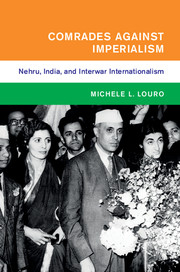Book contents
- Comrades against Imperialism
- Global and International History
- Comrades against Imperialism
- Copyright page
- Dedication
- Contents
- Figures
- Acknowledgments
- Note on Text and Transliteration
- Abbreviations
- Introduction Nehru and the Interwar World
- Part I Mobilizing against Empire, 1927–1930
- Part II Afterlives of Anti-Imperialism
- 5 Nehru’s Anti-Imperialism after 1930
- 6 Peace and War, 1936–1939
- 7 The War and the Fate of Anti-Imperialist Internationalism
- Bibliography
- Index
7 - The War and the Fate of Anti-Imperialist Internationalism
from Part II - Afterlives of Anti-Imperialism
Published online by Cambridge University Press: 22 February 2018
- Comrades against Imperialism
- Global and International History
- Comrades against Imperialism
- Copyright page
- Dedication
- Contents
- Figures
- Acknowledgments
- Note on Text and Transliteration
- Abbreviations
- Introduction Nehru and the Interwar World
- Part I Mobilizing against Empire, 1927–1930
- Part II Afterlives of Anti-Imperialism
- 5 Nehru’s Anti-Imperialism after 1930
- 6 Peace and War, 1936–1939
- 7 The War and the Fate of Anti-Imperialist Internationalism
- Bibliography
- Index
Summary
- Type
- Chapter
- Information
- Comrades against ImperialismNehru, India, and Interwar Internationalism, pp. 256 - 283Publisher: Cambridge University PressPrint publication year: 2018



